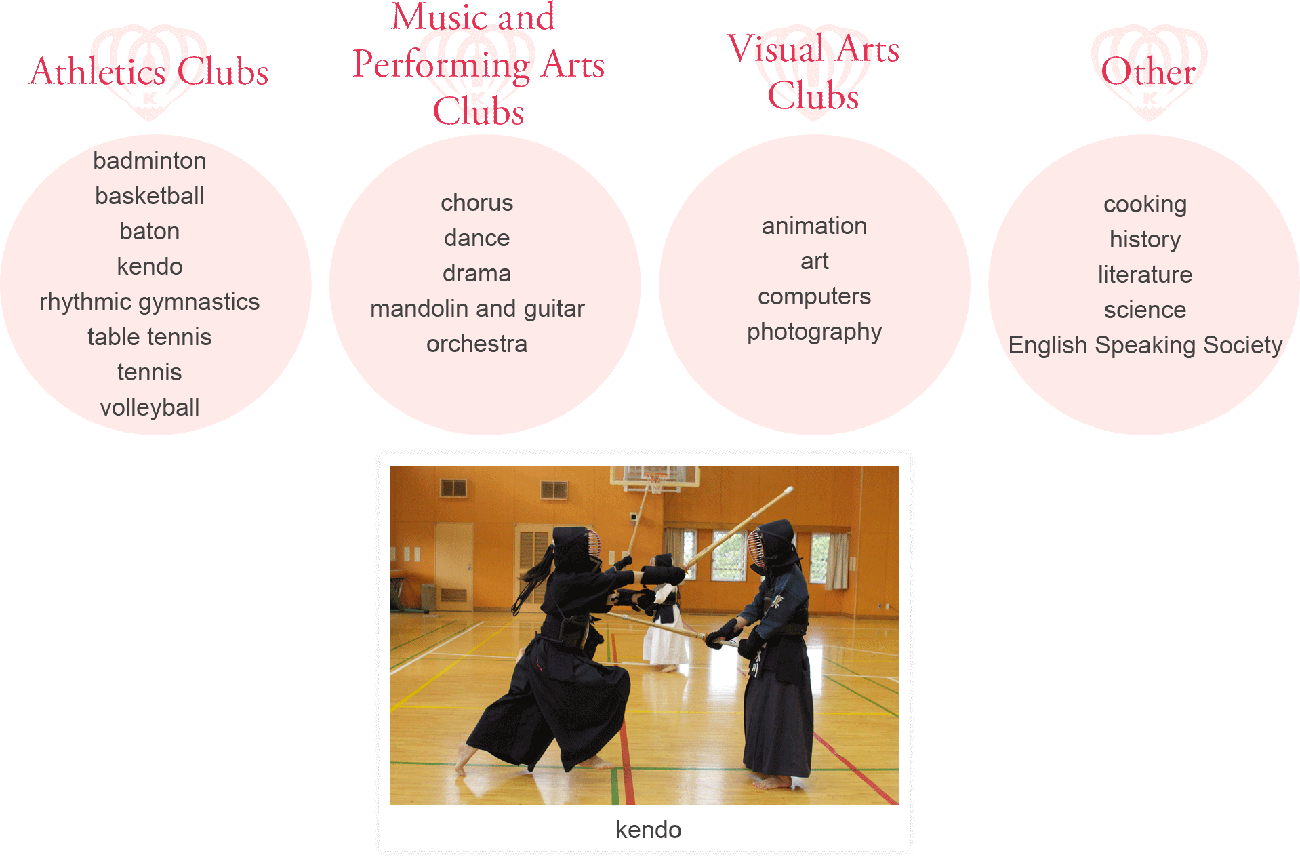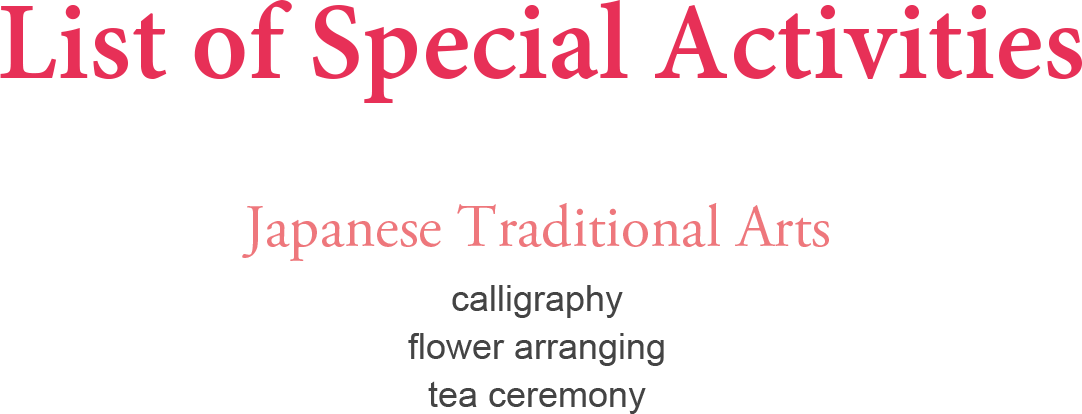Kamakura Jogakuin offers students the opportunity to participate in extra-curricular club activities after school and on the weekend. These enrich school life by enabling students to explore interests beyond their academic work, while also providing a great chance to develop teamwork and leadership skills. Sports and musical activities also offer opportunities to participate in inter-school leagues and contests.
There are also special activities involving Japanese traditional arts and music which meet on a regular basis. These are taught by external teachers. The school culture festival, at the end of Semester 1, gives clubs and special activity groups a chance to showcase their work.

Kamakura Jogakuin offers students a range of curricula which will allow them to become part of the globally-competitive work-force. Below is a list of subjects offered to junior and senior high school students.
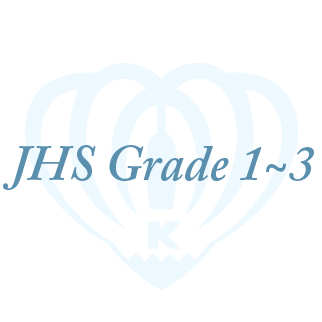

- ・ art
- ・ English (including Oral Communication with native English teachers**)
- ・ health and physical education
- ・ home economics (including computers)
- ・ Japanese (including Japanese classics)
- ・ math
- ・ music
- ・ science
- ・ social studies
- ・ environmental studies
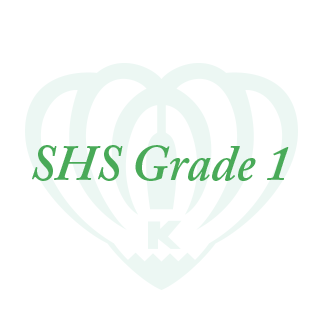

- ・ English (including one lesson a week with native English teachers)
- ・ general studies (includes fieldwork, special programs, volunteer work, job experience)
- ・ health and physical education
- ・ home economics
- ・ Japanese (including Japanese classics)
- ・ math
- ・ science
- ・ social studies

- ・ art
- ・ calligraphy
- ・ music


- ・ biology
- ・ English
- ・ information technology
- ・ Japanese (including Japanese classics)
- ・ math
- ・ physical education
- ・ social studies

- ・ earth science

- ・ chemistry
- ・ physics

- ・ art
- ・ extra math
- ・ geography
- ・ music
- ・ English oral communication (Global Studies)


- ・ English
- ・ health and physical education
- ・ Japanese (including Japanese classics)

- ・ art
- ・ biology
- ・ earth science
- ・ ethics
- ・ geography
- ・ history
- ・ math
- ・ music
- ・ English oral communication (Global Studies)
- ・ politics
- ・ biology (optional)
- ・ chemistry (mandatory)
- ・ math (mandatory)
- ・ physics (optional)
In addition to the option of joining calligraphy as a special activity, senior high school first year students can take an elective course in shodo, or the art of writing kanji (Chinese characters) and Japanese hiragana with a brush and ink.
Throughout their time at Kamakura Jogakuin, students have a chance to study about the history and culture of Kamakura. Fields of study include:
- ・Field Work in the Kamakura Area: JHS Grade1 students research the natural environment, geography, history and work culture of the area
- ・Literature and arts in Kamakura: JHS Grade2 students visit museums of art and literature
- ・Kamakura Noh Stage: In addition to the Kabuki performance they see at Kabuki-za in Tokyo, SHS first grade students have a chance to see a local Noh performance
It is hoped that all subjects, where possible, try to incorporate references to local culture.
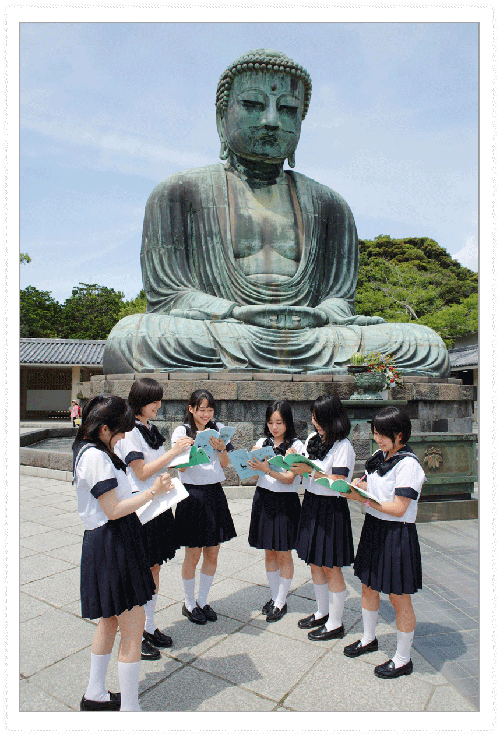
Early in the first semester, JHS Grade 1 students have an etiquette lesson, in which they study, among other things, how to bow and how to use chopsticks correctly. This lesson is taught by the tea ceremony teacher.
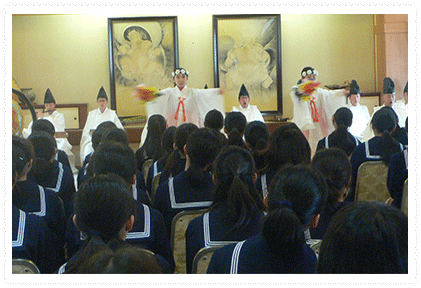
Tsurugaoka Hachimangu Shrine: Students visit this renowned shrine to attend a performance of ancient court music known as gagaku.
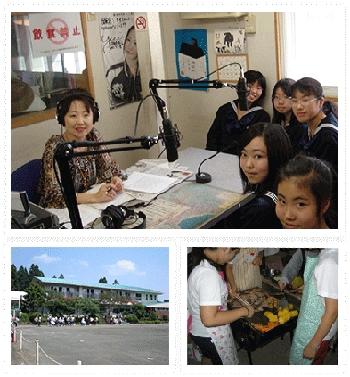
Workplace Experience: JHS Grade 1 students have the opportunity to observe people engaged in various commercial activities around the Kamakura area. For example, they visit the Kamakura City Assembly to watch local government in action. They also visit stores, small scale factories and radio stations which have been owned and managed by the same families for generations in order to get a deeper historical feel for Kamakura.
Summer Camp Activities in Amagi, Izu: JHS Grade 1 & 2 students learn about teamwork, trust-building, local literature, and nature through the 2-overnight program.
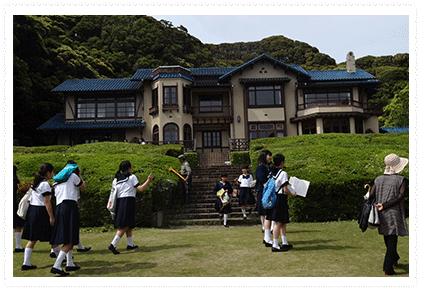
Kamakura Museum of National Treasure: Students learn about ways of appreciating Buddhist images and paintings after taking the lecture on Kamakura history and appreciation of cultural assets from the director of Kamakura Museum of National Treasure.
Kamakura Museum of Literature: Students learn about local writers and their works.
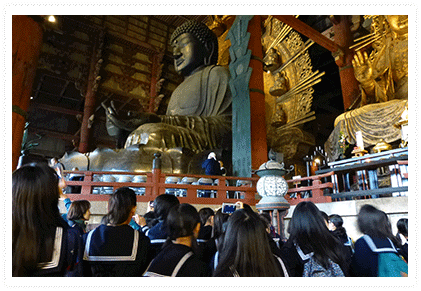
Trip to Kyoto and Nara: After studying about the history of Kamakura through the Kamakura Studies Program in JHS Grade 1 and 2, students spend a few days visiting and learning about the cities of Kyoto and Nara, cradles of Japanese culture.
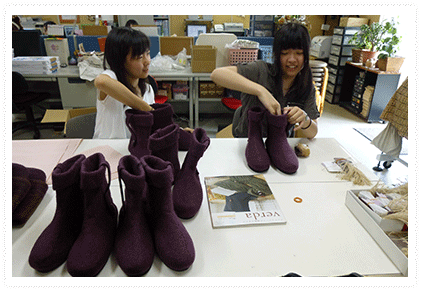
Social Welfare Activities: Students do short placements with local companies and/or NGOs over the summer holidays. This work experience enables students to gain an insight into the workings of specific careers and workplaces.
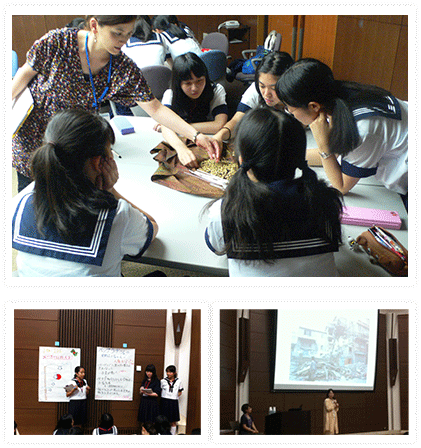
Shonan Kokusai Village International Intercultural Understanding Seminar in Hayama: In this weekend seminar, students attend courses linked to global issues; they participate in group discussions, debates and presentations to raise awareness of: north-south issues; global environmental issues; world poverty; fair trade and global food issues.
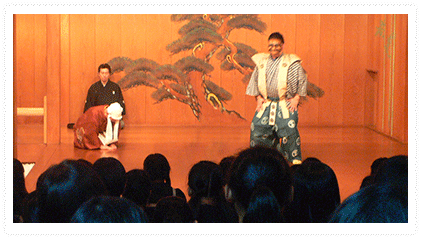
Noh performance in Kamakura, Kabuki performance at Kabuki-za in Tokyo: Students appreciate Noh and Kyogen (Noh comedies) performances at the theatre in Hase, Kamakura, and Kabuki performances at Kabuki-za in Tokyo.
Skiing trip: Students learn how to ski in Sugadaira, Nagano for three nights.
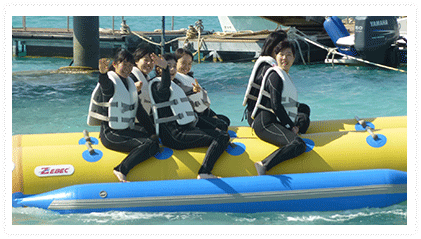
Trip to Okinawa: Students travel to the southern island of Okinawa to study its history and culture; to learn about multi-cultural societies and to observe and study local environmental problems.
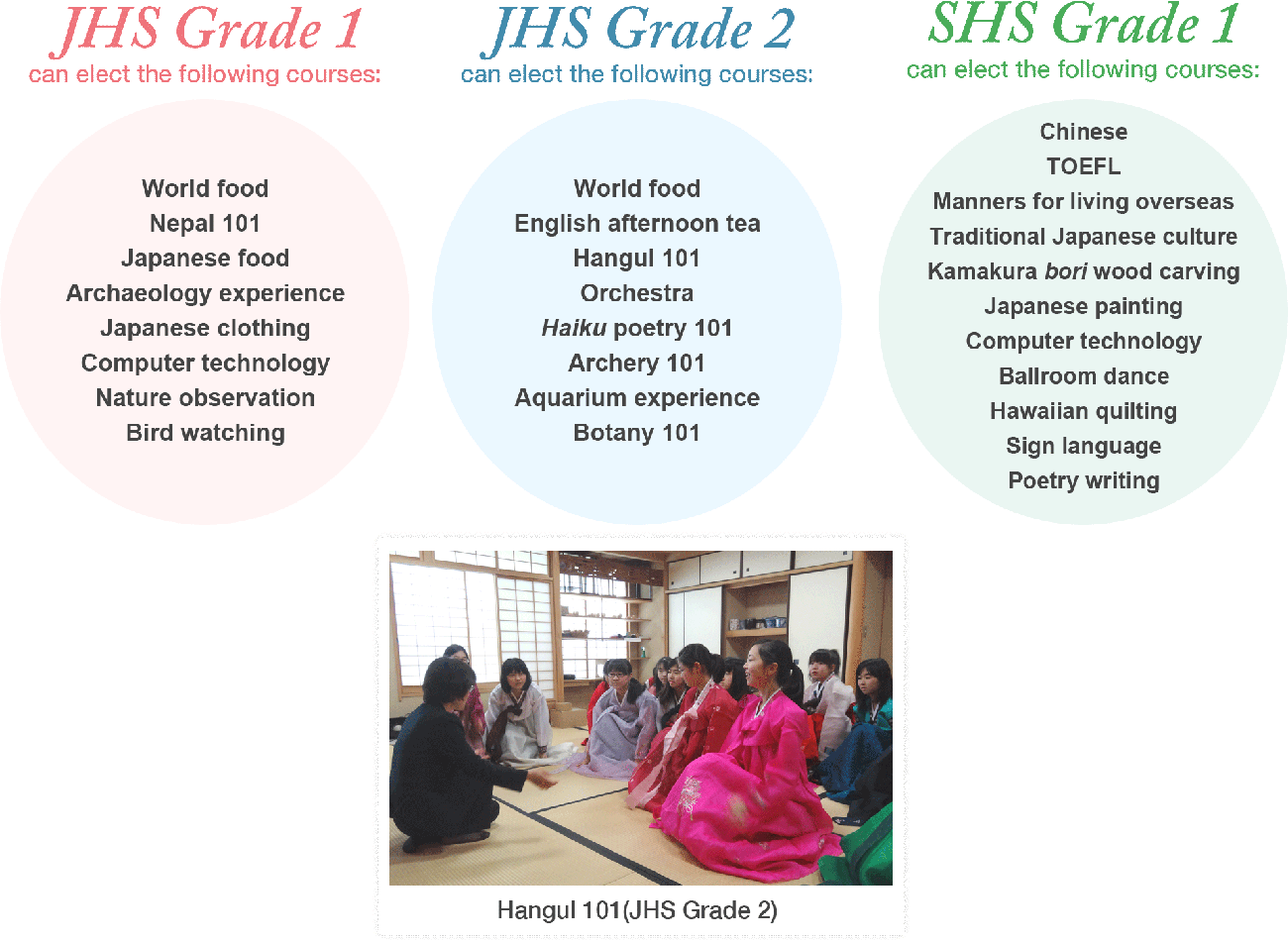
A traditional event in Japanese schools, the sports festival takes place in late May at the beginning of Semester 1. The students gather at Yokohama Cultural Gymnasium to participate in a day-long sports competition. All grades compete in many fun and challenging events. At the end of the day, the winning grades for both the junior high school and the high school win trophies. Family members come to watch and cheer for the students. It is a great experience for the students to work together as a team in a competitive environment. Some popular events include relays, the tug of war and a quadrille, which is a special 4-person dance performed only by the high school seniors at what is their last sports festival before graduation.
The school culture festival, which takes place at the end of Semester 1 in late September, gives students the chance to showcase club activities, special activities, exchange programs, and various other aspects of school life, in a lively and interactive way. It is also a great way for students to experience the challenges and rewards of event organisation.
- The culture festival incorporates:
- ・ presentations and displays in English about the Canada and America exchange programs
- ・ drama and dance performances
- ・ baton and rhythmic gymnastics displays
- ・ musical performances by the mandolin and guitar club and the orchestra club
- ・ English story-telling performances by the English Speaking Society
- ・ exhibitions of art, photography, calligraphy, manga, and floral arrangement
- ・ showings of short films by the movie club
- ・ history and culture displays
- ・ demonstrations of experiments and programming by the science and computer clubs
- ・ tea ceremony
- ・ display and sale of products related to volunteer activities by the students
- ・ poster displays and presentations of themes from the
Shonan Kokusai Village International Intercultural
Understanding Seminar in Hayama
This school-wide singing competition takes place in December at the Kamakura Performing Arts Center. Each homeroom chooses a song and starts practicing it months in advance. Finally at the choral concert, each homeroom performs their number on stage in front of the rest of the school with one student conducting and one student accompanying on piano. The best classes in junior high and high school receive gold, silver and bronze prizes. While the preparation and practice for the choral concert is quite tough, it provides an opportunity for the students to build a better relationship as a class and gives them a sense of responsibility and pride.
This annual orchestral concert takes place in March at the beginning of the spring holiday. The school orchestra performs several pieces at Kamakura Geijutsukan Hall in Ofuna. It is a great way to gather the school together and celebrate the passing of another academic year and the arrival of spring. This is a charity concert and all proceeds go towards improving education for students in Nepal.
